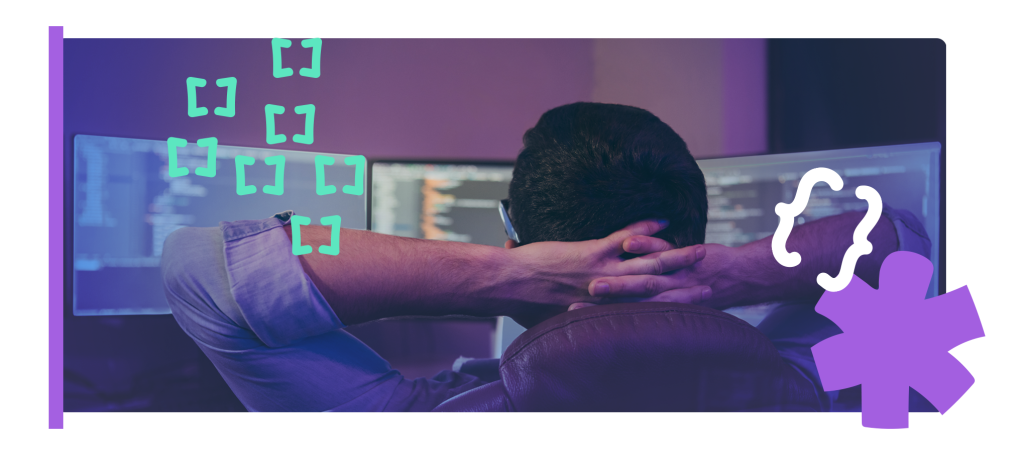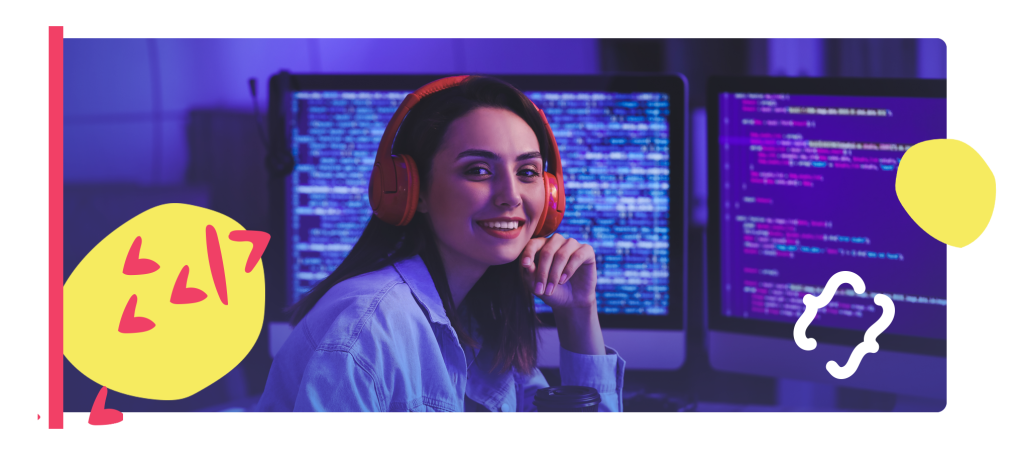Are you curious about the world of IT but think it’s a mysterious, exclusive club for programmers only? We’re here to help you navigate this exciting world. We’ll answer all your burning questions and debunk some industry myths you might have heard. From exploring different types of IT roles to showing how easy it is to retrain for a tech career, we’ll help you take the first steps toward your dream job.

Ah, the tech industry. It’s like a mythical land that only the chosen few can access, right? Wrong! The truth is, the world of IT is more diverse than you think. There are a number of well-paying jobs and even some that don’t require any programming skills at all.
Of course, having programming skills under your belt will never hurt. But plenty of roles out there will give you a piece of the IT pie without needing to know how to code.
We’ve gathered all the answers to all your burning questions that you’ve been dying to ask about the industry. From debunking industry myths to exploring different types of IT roles, we’ll help you navigate the waters of IT with ease.
Table of Contents
The IT industry’s best-kept secrets
Lorem ipsum dolor sit amet, consectetur adipiscing elit. Ut elit tellus, luctus nec ullamcorper mattis, pulvinar dapibus leo.

1. It's easier than you think to switch to a career in IT
The demand for tech-savvy employees is off the charts, no matter what industry you’re in or where you’re located.
Don’t sweat if you’re feeling lost and don’t know where to start. You can start small and work your way up. One way to do that is by finding tech-related tasks within the company you’re already working for. Start by taking on those tasks; before you know it, you could be a bona fide IT whiz.
2. You can be very creative in IT. It's not just a job of numbers.
We need to clear the air on a common misconception about technical jobs. Some people seem to think that working in IT means giving up on your creative side. But let us tell you, that’s just plain wrong.
Working in the tech industry requires a ton of creativity. You have to think outside the box to solve problems and come up with new programs that will blow people away. So if you’re an aspiring tech pro with love for all things creative, don’t let anyone tell you you can’t have both.

3. You won't be tied to a desk
The old-school 9 to 5 office grind is outdated. Companies are starting to realize this, too, and that’s why many of them are starting to break traditional office conventions.
Some are implementing flexible schedules so employees can work when and where they want. Others are spicing up their office spaces with bean bags and cool community spaces.
And IT jobs are perfect for these new changes! Whether writing code from the comfort of your couch, chilling at a cafe with your laptop or swaying in a hammock, you can get your work done without being chained to a desk.
I have been interested in computers since my childhood, and in addition to that, IT is quite a flexible profession. I only need a laptop and internet connection, nothing else, and I can accomplish my tasks from anywhere in the world.
Levi, ex-Codecool student, now Software Developer Tweet

4. You won't feel isolated or alone
Collaboration is key in IT projects nowadays! Even if you work remotely, connecting with clients and working in teams is becoming more common. Luckily, there are tons of tools and apps available that make group meetings and editing software with multiple people easier.
5. You can work as a freelancer
Why work for someone else when you can work for yourself in the IT industry? With only a laptop and an internet connection, you can take on smaller web design or programming jobs as a freelancer. From creating websites for local businesses to taking on projects from around the globe, the possibilities are endless. Plus, as your own boss, you get to call the shots and work on projects you’re truly passionate about. Who wouldn’t want that kind of freedom?

What job options are available in IT?
If you choose the IT field, then you should know that there are several jobs available depending on your interests, and some of these jobs do not even require extensive programming knowledge.
Jobs that do not require programming knowledge:
If you’re interested in technical fields, there are many jobs you can explore without coding knowledge. From IT technician, network technician, network administrator, system administrator, and network analyst, as well as data analyst, UX designer, QA tester, and IT recruiter, the possibilities are endless! While programming knowledge isn’t always required, having some basic coding principles under your belt will make your life easier.

Jobs that require programming knowledge:
IT jobs that require programming knowledge involve the development of new software, applications, or programs. If you want to be free to use your imagination and create new things, you should consider jobs such as front-end developer, back-end developer, or full-stack developer.
At Codecool, we offer a 10-month Full Stack Development course which does not require prior knowledge or IT skills and, most importantly, comes with a job guarantee. After completing the course, you will enter a traineeship program at a Codecool partner company, where you will apply what you have learned, learn to quickly adapt to new challenges, and gain valuable experience as a junior full-stack developer.

Web developer
They’re one of the most sought-after positions in the IT industry, and for a great reason. Without them, we wouldn’t be able to enjoy the internet in the same way.
Think about it. Have you ever been on your favorite website and thought, “Hey, I’d love to create something like this!” Well, good news, because Web Developers (front-end, back-end, or full-stack) can do all kinds of cool things like creating new websites and making buttons do magical things when you click them.
Front-end developer
Front-end developers are like the artists of the internet. They bring beautiful designs to life on new websites and applications.
Their job is to ensure everything looks great and functions flawlessly on the front end. They check for any pesky errors or bugs and ensure the design looks perfect on any platform or browser. If you’re interested in becoming a front-end web developer, there are a few key languages you should get familiar with, like HTML, CSS, and JavaScript. Once you’ve got those down, you’ll be well on your way to creating beautiful websites.

Back-end developer
Developers who work on the back end are the tech wizards behind the scenes who make everything run smoothly. Their job is to create codes and programs that operate servers, databases, and other server applications. As a back-end web developer, the most important thing you need to have is the ability to create clean and efficient programs that do everything you want in the shortest time possible. Sounds pretty cool, right?
If you’re interested in becoming a back-end web developer, there are a few programming languages you should learn, like PHP, Java, Python, Ruby, and SQL.
Full stack web developer
These developers are experts in processes and strategies, which puts them in the perfect position to oversee entire projects from start to finish. Pretty impressive, right?
If you’re interested in becoming a full-stack developer, there’s good news! You can learn about it and become one in less than one year by signing up for the Codecool full-stack development course.

Desktop developer
This job involves developing applications such as text editors, browsers, video player programs, and other applications that can run on a computer. Video games are also included here; in some cases, companies can develop specific applications for their fields of activity.
You must know programming languages such as C++, Java, C#, or Swift to develop these applications. It is impressive that C++, although it is one of the oldest programming languages, is still one of the most used.
Mobile developer
In addition to developing websites and desktop applications, a third highly sought-after job in the IT field is an app developer. Here you need to know coding languages such as Java for Android and Swift for iOS.

Game Developer
Game developers are awesome programmers who specialize in making games that give you an immersive experience.
While some game developers work on other types of software, most of the time, they have specialized skills and knowledge in game development. They use different frameworks like DirectX, OpenGL, Unity 3D, and WebGL to create games that look and feel amazing. They also use programming languages like C, C++, and Java to bring their ideas to life.
Data scientist
This type of programmer writes codes for data analysis and is mostly involved in statistical analysis, machine learning, data visualization, and predictive modeling. Their most commonly used languages include SQL, R, and Python.
DevOps Developer
DevOps developers are familiar with the technologies to develop systems that build, integrate, and administer back-end software. Technologies they use include Kubernetes, Docker, Apache Mesos, HashiCorp stack (Terraform, Vagrant, Packer, Vault, Consul, Nomad), Jenkins, and others.
Software Tester
A software tester’s mission is to ensure that the final product is designed to meet the client’s requirements and function properly, identifying errors and issues to ensure that the developed product meets quality standards.
The technical skills required for a tester job include algorithm design, software architecture, security management, data storage system design, comprehensive and unit testing, and other valuable skills.
I love that I learn something new almost every day; there is always a challenge in my job, and I feel it’s absolutely worth the change.
Panni, ex Codecooler, Software Tester Tweet

Which programming languages should you know to get a job?
Although the programming languages differ in the job categories mentioned above, it is important to remember that they are all based on the same fundamental concepts. Although they run on different systems or use different codes, the essence is the same, and in fact, involves ways of structuring thinking. Once you understand these principles, you can easily apply them to write code and create programs.
Among the most commonly used programming languages today are, of course, HTML, CSS, Java, JavaScript, C++, PHP, Python, and Ruby, depending on the type of program you want to develop. Learn more about the most sought-after programming languages in 2022 from our guide.
What do you need to study? Is college necessary? Can I learn on my own?
The importance of having a degree in IT is fading. The truth is, you really don’t need a college degree, master’s degree, or Ph.D. to work in the IT field, let alone to get a well-paid job.
Employers look more at your experiences and skills than the degrees acquired. Therefore, IT is considered an opportunistic field for a career changer, unlike other fields where college degrees are still mandatory.
Take the first step towards a better future
It only takes 10 months to become a job-ready full-stack developer with us. Our course is based on practice-oriented learning and our mastery-based methodology, which guarantees the quality of the knowledge you acquire. You do not need any previous qualifications, and you can complete the course modules at your own pace, guided by mentors.
Throughout the course, you will gain knowledge of both front-end and back-end development. And also soft skills, which are incremental to becoming a top developer.